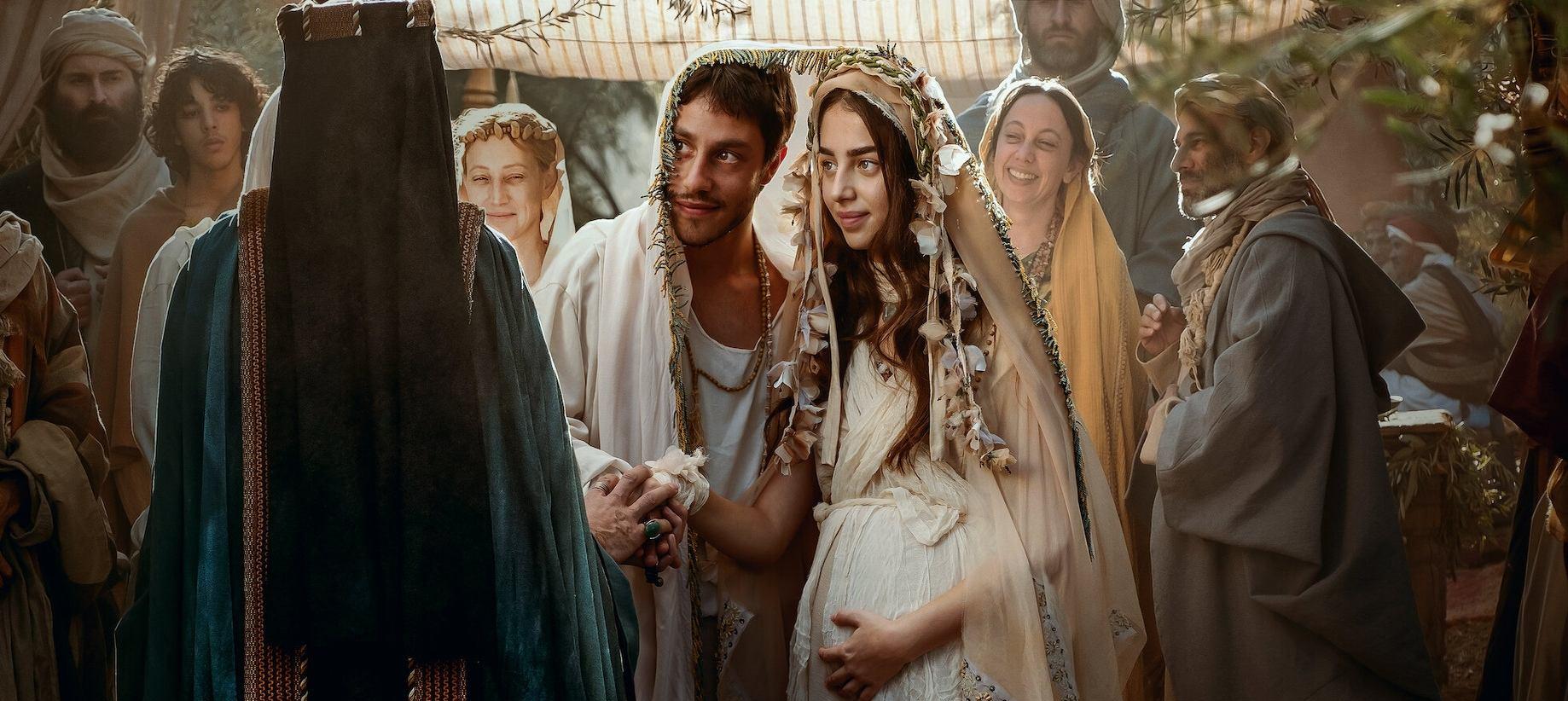Mary
Reviewed by: Charity Bishop
CONTRIBUTOR
| Moral Rating: | Extremely Offensive |
| Moviemaking Quality: |
|
| Primary Audience: | Adults |
| Genre: | Drama |
| Length: | 1 hr. 52 min. |
| Year of Release: | 2024 |
| USA Release: |
December 6, 2024 |
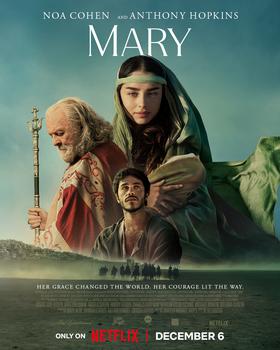

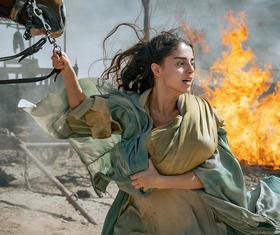
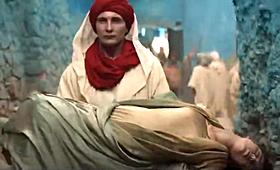
Even Pope Innocent I (405 AD) and Pope Gelasius I condemned the “Protoevangelium of James” (aka the “Story of the Birth of Saint Mary, Mother of God”) as APOCRYPHA. The author is unknown, but it is possibly from a heretical sect called the Gnostic Encratites, whose Syrian founder, Tatian, wrongly taught that sex and marriage are symptoms of original sin and forbid marriage.
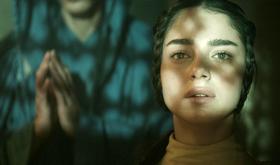
Mary of the Bible versus Roman Catholicism’s QUEEN OF HEAVEN, Perpetual Virgin Mary
Who is the real Biblical MARY, THE MOTHER OF JESUS the Christ
Who is JOSEPH, the adoptive-father of Jesus Christ?
How do we know that JESUS IS THE MESSIAH?
LIST OF MESSIANIC PROPHECIES fulfilled by Jesus Christ

About JESUS CHRIST—Answers to frequently-asked-questions
Is Jesus Christ a man, or is he God?
How do we know THE BIBLE IS TRUE?
INFALLIBILITY—How can the Bible be infallible if it is written by fallible humans?

What else does the Bible teach about ANGELS?
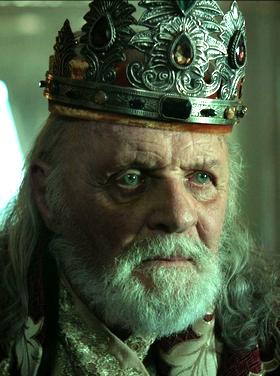
Who is HEROD THE GREAT? and what did he do?
Was Jesus born in a stable? a cave? a barn?

The Birth of Jesus Christ—enlightenment and answers for skeptics
| Featuring |
Noa Cohen … Mary Ido Tako … Joseph Ori Pfeffer … Joachim Anthony Hopkins … Herod Hilla Vidor … Anne Dudley O'Shaughnessy … Gabriel Mili Avital … Mariamne Stephanie Nur … Salome See all » |
| Director |
D.J. Caruso |
| Producer |
Mary Aloe … producer Joshua Harris … producer Gillian Hormel … producer Hannah Leader … producer Executive Producers— Joel Osteen See all » |
| Distributor |
This strange film about Mary, the mother of Jesus, comes from the “Protoevangelium of James,” a non-scriptural, apocryphal text that describes Mary’s life before her son’s immaculate conception. The original “book” establishes Mary as a virgin, born of a miraculous conception, and is where most Catholic theology about Mary as an eternal virgin originates. The filmmakers don’t seem to know the movie’s primary audience, or who it’s for, making for an awkward film. It is not Catholic enough for Catholics, too Catholic for Protestants, and too weird for atheists.
It begins the year before Mary’s birth. Her parents have been long married and are barren, so her father journeys into the wilderness to fast and pray for forty days. The angel Gabriel (Dudley O'Shaughnessy) visits him and tells him he will be given a daughter, then tells her mother the same. But Gabriel also makes them promise they will devote their daughter to the service of God.
Many years later, Mary is a gifted child to whom butterflies are drawn. The day comes to turn her over to the service of Jewish nuns at the Temple, and the prophetess Anna (Susan Brown) takes a particular interest in her. (This is a Jewish nunnery full of girls, but no such thing existed historically.)
Sometime later, Mary (Noa Cohen) is known throughout the temple as a kind but strong-willed girl, who goes out of her way to show charity to the needy. One day, while washing clothes in the river, she attracts the attention of the young stonemason, Joseph (Ido Tako), who falls in love with her on the spot, as guided to her by Gabriel.
Little do either of them know that their love story, and a miraculous conception, will draw the attention of the insane King Herod (Anthony Hopkins) to them, and change the course of history forever…
Obviously, if you know anything about the New Testament story, this is all going to sound strange and unbiblical, and that is true. It’s quite heretical, and I don’t recommend it, but for the sake of exploring why, let’s dig in.
This film actually deviates from its Catholic source material in its decision to show Joseph as a young man, rather than the “old widower” that marries Mary in the source text (thus, he had no desire to sleep with Mary, and she could remain a virgin throughout her entire life in accordance with Catholic doctrine; which I suspect came from a need in ancient times to replace the pagan goddesses with a similar female icon. Thus, Mary, the Virgin).
A lot of its story beats do not line up with the Gospel as presented in the New Testament (various exchanges and omissions are added, including Gabriel not warning them to flee to Egypt), nor will most Protestants agree with its take on Mary or on Joseph, who has to protect his family from Herod’s soldiers and winds up brutally wrapping a man in a burning net and leaving him to an agonizing death. Instead of sneaking off to Egypt in the middle of the night, they flee in the midst of chaos, are caught, and must defend themselves with violence.
Beyond the stuff about Mary’s supposed divine conception, her magical powers, and her stint in a Jewish nunnery, I hated the depiction of the angel Gabriel. He is creepy and seems more like a demon than an angel, lurking in shadows with glowing eyes and often talking without moving his mouth. He and Lucifer seem too much alike, both in mannerism and weirdness (perhaps it’s an attempt to show us that spiritual beings can be “scary,” but I have seen it done a lot better).
The story also invents Lucifer’s desire to “corrupt” Mary by causing her to fall into sin. He shows up outside of the temple and tries to seduce her, then to make her fall into pride, and finally invites her to pledge her allegiance to King Herod rather than God. (Later, he kidnaps Mary and levitates her away, until Joseph stabs him through the chest and… kills him? Or was it a dream? The film does not tell us.)
Content-wise, it’s a PG-13. Much is made of Mary insisting she’s a virgin despite being pregnant and others questioning this. Lucifer appears to her and suggests she needs more pleasure in her life, and he can offer it to her. He acts predatory toward her several times.
People are stabbed off-screen and on. Romans oppress Jews and kill them. A man murders his wife by knifing her in the chest. A main character is killed in a skirmish. Babies are ripped from their mothers’ arms, and their mothers are stabbed. At the climax, four people fight off a group of Roman soldiers and wind up killing them all, while two of them are also killed. A priest has a crown of porcupine quills shoved down on his head until it blinds him. The main characters come home to a house full of torn up furniture and slaughtered sheep. A man is beaten in the street with a length of chain.
Some of the ideas I enjoyed (like seeing Mary feeding the poor and her kindness toward cripples), and there were moments that I loved, such as Joseph spotting Mary along the river washing her clothes and falling in love with her enough to beg for her hand in marriage, despite not knowing her name. It is a cute, romantic moment in a film overshadowed by violence and weird theological slants.
Hopkins is excellent, a terrifying and demented king who stabs people he doesn’t like and playfully asks his sister if she’d mind him killing her husband for treason.
Israeli actress Noa Cohen makes a good Mary. She is sweet, charming, compassionate, and feisty when the time calls for it. I enjoyed how they built up back stories, professions, and little intrigues with her family. They gave her father a job (he owns an olive grove) and they touch on the Zealots of the day and their resentments toward Herod and his hand-in-hand governorship alongside of Rome. It is also gritty, with a lot of emphasis placed on the oppression of the Jews (they are beaten, stoned, and stabbed) that helps us understand what life was like for them in Judea at the time.
The pacing is uneven. The film jumps around for the first 20 minutes, and it doesn’t flow. We leap around learning about her parents and her conception, then we meet King Herod and see his random acts of violence (which have nothing to do with the plot), then we’re thrust more into a story we sort of know, but not really, and that’s where the historical inaccuracies and plot holes abound. (Mary and Joseph travel around in a coach that won’t be invented for another few hundred years. They had a modest donkey rather than a horse worth a small fortune. Her family must be rich to afford all their luxuries, and most Jews didn’t have horses, either.)
I watched “Mary” with my adult family, and we were all bewildered by it, because it did not know what it wanted to be, or which audience to appeal to. It won’t pass muster with Protestants, but also deviates from the doctrine about Mary in ways that won’t please Catholics (for example, their belief that she experienced no pain in childbirth). The brutal violence that her husband shows toward others near the end undermines the message Jesus brought of peace. Mary tells us that “love will save the world.” She means Jesus, and that is true, but… this isn’t the place to discover His story. Open your Bible instead.
- Violence: Very Heavy
- Occult: Mild
- Sex: Minor
- Wokeism: Minor
- Profane language: None
- Vulgar/Crude language: None
- Nudity: None
- Drugs/Alcohol: None
 Did Jesus Christ have brothers or sisters?
Did Jesus Christ have brothers or sisters?
Learn about DISCERNMENT—wisdom in making personal entertainment decisions
 Learn the truth about Jesus Christ’s birth and purpose. Includes answers for skeptics.
Learn the truth about Jesus Christ’s birth and purpose. Includes answers for skeptics.
See list of Relevant Issues—questions-and-answers.


PLEASE share your observations and insights to be posted here.
